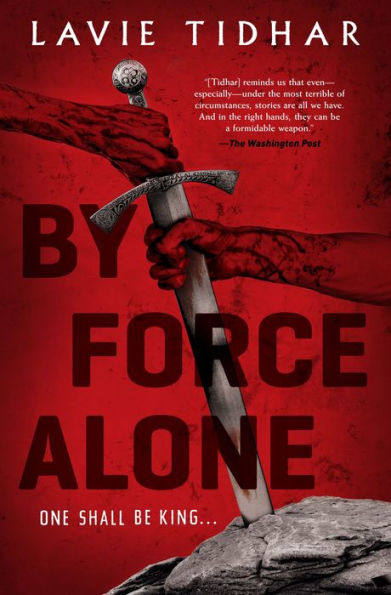The Matter of Britain, the cycle of stories relating to King Arthur and his knights, is as capacious a set of legends as the world possesses, and so the tales have received a staggering range of interpretations. From Tennyson’s pious odes to Victorian Britain, through Mark Twain’s declaration of Yankee independence, from Wagner’s promotion of the German volk and Edwar Burne-Jones’s self-consciously old-fashioned paintings to T.H. White’s tragicomic elegies, King Arthur has accommodated every vision or concern that artists have attached to him. Perhaps each era gets the Arthur it requires.
Lavie Tidhar’s By Force Alone gives us an Arthur for the Brexit era: A tyrant in lieu of a king, brute violence in lieu of gallant feats, undisguised venality in lieu of chivalric ideals. This is the Matter of Britain become the Matter with Britain.
The novel takes place in a real historical moment, the early Middle Ages after Rome abandoned its British holdings, with Christianity ascendant on the British Isles but not yet dominant, but anyone expecting further concessions to historical reality will be disappointed. Though much of the Arthurian canon is subverted, travestied, or rationalized, Tidhar’s Britain remains full of the strange and supernatural. To take just three examples: A severed head, rotting for years on a pike, delivers prophecies; Merlin, lost in the fog of the otherworld, defeats the Wild Hunt by recourse to mathematic logic; creatures from beyond the stars endlessly interrogate, kill, and reanimate a man in the vain hope of making sense of his tale. For all the bleakness and cynicism of his story, Tidhar’s profligate invention makes By Force Alone a joy.
By Force Alone has a cast of hundreds, but identifying the least bad character will tax any reader. Arthur gets his start leading a street gang and cornering Londinium’s market for the drug “Goblin Fruit.” Lancelot is an itinerant Nubian assassin. Galahad is a pimp and Kay is a pander. Guinevere and Isolde are bandits. Merlin, who only looks human, feeds off power, and will promote anyone who might one day possess it. The Lady of the Lake is a supernatural arms dealer.
Buy the Book


By Force Alone
Considering its foulmouthed, grasping, violent, and abusive knights, had By Force Alone appeared several years ago, the publicists and blurbers would have heralded it as Le Morte d’Arthur by way of Guy Ritchie. Unfortunately, in 2017 Ritchie released King Arthur: Legend of the Sword to general disapproval. And while the comparison with Ritchie’s early gangster films has some merit, Tidhar isn’t a believer in shock for shock’s sake.
Lavie Tidhar’s Arthurian debunking may be extreme, but his readers should expect nothing less. Books like A Man Lies Dreaming, an alternate history detective novel in which Hitler plays private eye, and Osama, about the search for the creator of pulp thriller hero Osama bin Laden, match provocative subjects with lightning pacing and thunderous prose. His words march brutally by, in short sharp shocks of fragments and abbreviated paragraphs. Here, for example, is how you become one of Camelot’s “made” men, a knight:
Galahad’s sword is already swinging.
The soft whoosh of metal, the sick plunge into skin and the hiss of blood, the sound of a bone breaking.
The head rolls in the dirt. The headless body falls forward and is still.
In The Once and Future King, T.H. White uses anachronism to delight readers—who doesn’t enjoy the little rush of spotting a reference?—and to remind his audience of the contemporary issues that plague his conscience and inspire his writing. We’re simultaneously reminded of Arthur’s fictionality and of our real circumstances. Tidhar employs a similar strategy in By Force Alone; his anachronisms alternately made me smile and shudder in recognition.I spotted lifts from T.S. Eliot and from Trainspotting, from Quentin Tarantino and from J. Robert Oppenheimer, from Blade Runner and from Hope Mirrlees’s 1926 novel Lud-in-the-Mist. A bravura sequence towards the end of the book pays homage to the Strugatsky Brothers, to Tarkovsky, and to Jeff VanderMeer, Tidhar riffing on old stories for the pure chaotic joy of it. Other interventions and interpretations on the classics are more pointed: A nightmarish mid-book sequence has that most Wagnerian, knight, Parsifal, ends up representing the endlessly resurgent and demonically cunning menace of fascism.
Tidhar’s Arthur, like Boris Johnson with a sword and better PR, fights to keep foreigners from his island. In the novel’s post-Roman setting, these foreigners include the Angles and the Saxons. Towards the end of the novel, Merlin imagines that one day the Angles and Saxons, convinced that they’ve always been there, will make Arthur their national hero. Jingoism is self-defeating in the short term and ridiculous in the long term.
The author supplies By Force Alone with three epigraphs. The third, dubiously attributed to Aristophanes, is “Fuck ’em if they can’t take a joke.” Lavie Tidhar’s joke on the Matter of Britain is a great one. And if the laughter catches in your throat, that just means you’ve been paying attention to the book, and to the world.
By Force Alone is available now from Tor Books.
Matt Keeley reads too much and watches too many movies. You can find him on Twitter at @mattkeeley.










